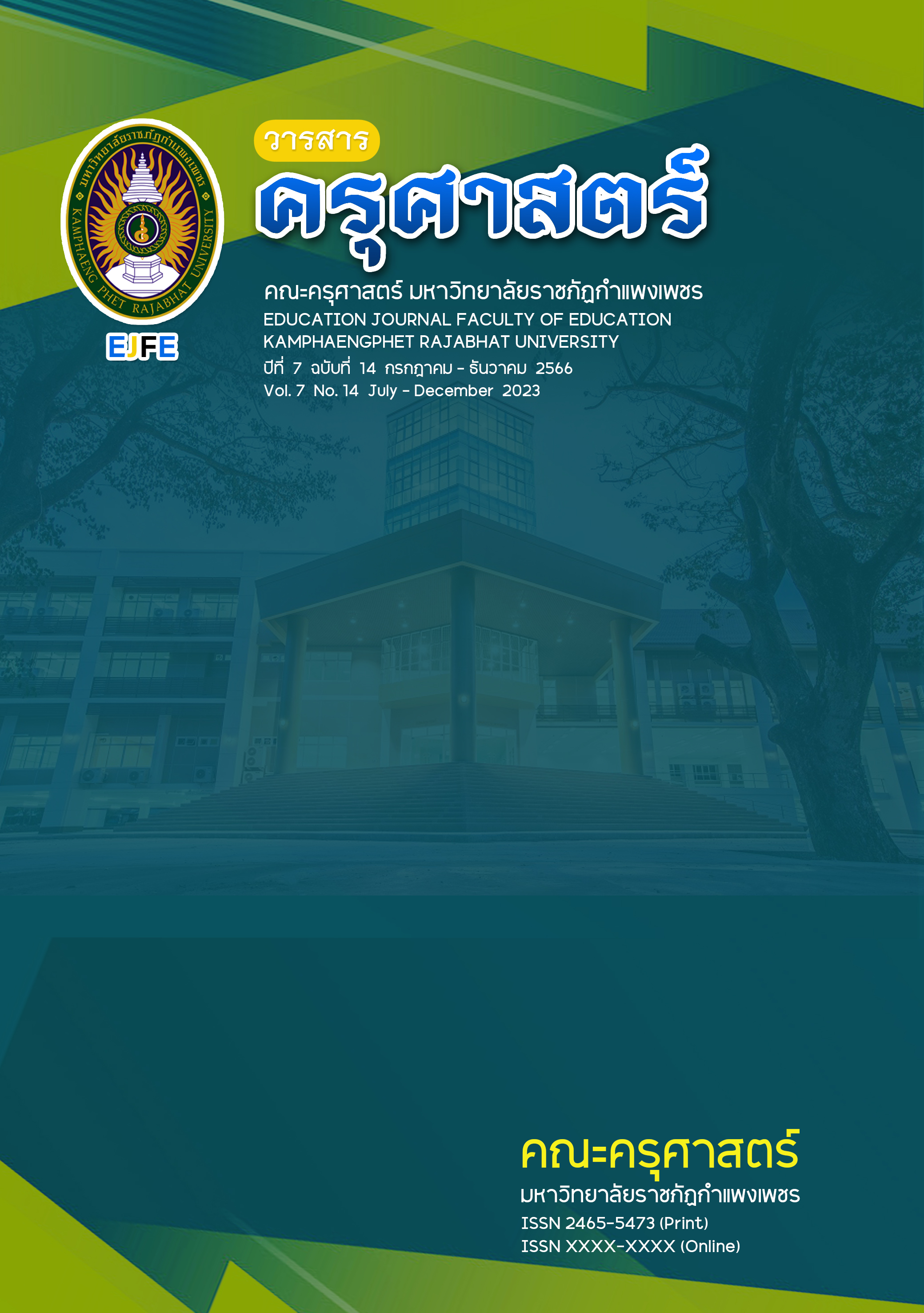Development of Manual of life skill experience for Earlychildhood Teachers at Municipal 3 School (Intharamphan Bunprakhong Pittayakhom School) in Kamphaeng Phet Province
Main Article Content
Abstract
The purpose of the study were to study the conditions of problem and the need to develop, implement and evaluate the appropriate of the manual of life skill experience for Teachers at Municipal 3 School (Intharamphan Bunprakhong Pittayakhom School) in Kamphaeng Phet Province. There were 6 steps of studying: (1) to study the relevance of the manual for early childhood teachers. (2) to develop a life skills experience management manual for early childhood teachers by studying concepts, theories and related documents, drafting of manuals and quality checking by 5 experts, and improving the trial manual. (3) to try out the manual with 20 simples of early childhood teachers and follow up the quality. (4) to improve it to be an effective manual. (5) to recheck the quality by other early childhood teachers utilizing it for 3 times with 3 groups. (6) to improve it to obtain the finalized manual.
The findings revealed that
- The problems in organizing life skills experience were divided into 3 areas: 1) the lack of
Knowledge in life skill of early childhood children. 2) Early childhood teachers were unable to classify life skills in each area. Moreover, it is not possible to clearly define the key components of each life skill clearly and comprehensive that distorted the interpretation of early childhood teachers. 3) the lack of space in exchange for learning about issues related to the development of life skills experience management for preschool children such as teachers or administrators who lack interaction and lacking opportunities to exchange knowledge and experiences what making the role of a teacher for pupils not yet work as a group or as a team
- The early childhood teachers evaluated themselves that they improved their knowledge after
using the draft manual at 0.01 level significant. Their attitude was at good level. They assessed the quality of the manual at a high level ( = 4.19). After a workshop, they evaluated the manual at high level ( = 3.92). Early childhood teachers were aware of the life skills experience at the high level ( 4.26).
- The result of verifying the quality of manual by another early childhood teachers:
(1) The two initial assessments were at high level ( = 3.94 and 4.23); the third was at the highest level ( = 4.95)
(2) The final assessment confirmed the quality of the manual by the early childhood teachers who utilized themselves was at high level ( = 4.39)
Article Details

This work is licensed under a Creative Commons Attribution-NonCommercial-NoDerivatives 4.0 International License.
CC Attribution-NonCommercial-NoDerivatives 4.0
References
กรณิศ ทองสะอาด. (2559). ทักษะชีวิตสำหรับเด็กปฐมวัย. โรงพิมพ์มหาวิทยาลัยสวนดุสิต.
กรมวิชาการ. (2560). หลักสูตรการศึกษาปฐมวัย พุทธศักราช 2560. โรงพิมพ์คุรุสภาลาดพร้าว.
จาฏุพัจน์ มงคลวัจน์. (2557). บทบาทของผู้ปกครองในการส่งเสริมทักษะชีวิตของเด็กวัยอนุบาล. http://www.edu.chula.ac.th/ojed/doc/V91/v91d0043.pdf.
จีระพันธุ์ พูลพัฒน์. (2556). การพัฒนาทักษะชีวิตสำหรับเด็กปฐมวัย. รายงานการวิจัยนำเสนอในการประชุมวิชาการครบรอบ 56 ปี แห่งการสถาปนา คณะครุศาสตร์จุฬาลงกรณ์มหาวิทยาลัย วันที่ 10 กรกฎาคม พ.ศ. 2556. คณะครุศาสตร์ จุฬาลงกรณ์มหาวิทยาลัย.
พัฒนา ชัชพงศ์. (2555). การเล่นเพื่อพัฒนา. http://www.kukai.ac.th/Thai/knowledge_ Play_to_develop.php.
พงษ์พันธ์ พงษ์โสภา. (2542). พฤติกรรมกลุ่ม. สำนักพิมพ์พัฒนศึกษา.
วิจารณ์ พานิช. (2555). วิถีสร้างการเรียนรู้เพื่อศิษย์ ในศตวรรษที่ 21. โรงพิมพ์บริษัทตถาตาพับลิเคชั่นจำกัด.
Bandura, A. (1969). Principles of behavior modification. New York: Holt, Rinehart and Winston.
Malti, T., & Latzko, B. (2010). Children's moral emotions and moral cognition:Towards an integrative perspective.New Directions for Child and Adolescent Development, 2010(129), 1-10. https://doi.org/10.1002/cd.272.
Meggitt, C., & Walker, J. (2004). An introduction to child care and education. Hodder & Stoughton, London.
National Childcare Accreditation Council. (2009). Supporting children’s development: Life skills. http://ncac.acecqa.gov.au/educator resources/pcfarticles/Life_skills_Dec09.pdf.


